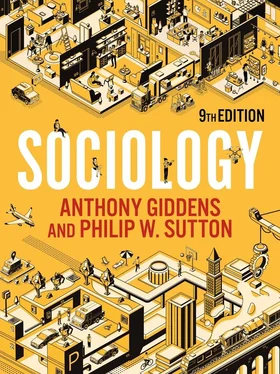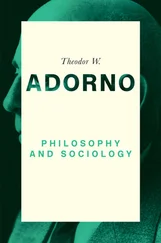Weber had major concerns about the outcome of the rationalization process. He feared that the spread of bureaucracy, which is the most efficient form of administration, would stifle creativity and imprison individuals in a ‘steel-hard cage’ from which there would be little chance of escape. This bureaucratic domination, although based on rational principles, could crush the human spirit by over-regulating every aspect of life. For Weber, the seemingly progressive agenda of the eighteenth-century Age of Enlightenment, of scientific progress, rising wealth and increasing happiness, also brought with it a dark side with new dangers.
Three theoretical traditions
As we have seen, Durkheim, Marx and Weber adopted different approaches to their studies. Durkheim emphasized the coercive strength of social forces in generating shared values and consensus. Marx also saw social structures as powerful, but he argued that conflict and inequality were endemic in all societies. On the other hand, Max Weber focused attention on the meaningful character of social life and the social actions of individuals. These basic differences have persisted throughout the history of sociology, developing into three broad sociological traditions: functionalism (Durkheim), conflict theory (Marx) and social action or ‘interactionist’ approaches (Weber).

Some of the major trade and economic transactions today take place on the stock market in a highly rationalized form, with barely any personal interaction between traders. This is in stark contrast to the personalized bartering and market stall negotiations which continue in many local communities.
The three traditions are introduced briefly below, but you will encounter arguments and ideas that draw upon them throughout the book. After a while you should be able to identify which tradition any particular research study you come across is closest to.

We look in detail at more recently developed theoretical approaches, such as feminism, postmodernism and figurational studies, in chapter 3, ‘Theories and Perspectives’.
Functionalism holds that society is a complex system whose various parts work together to produce stability and that sociology should investigate their relationships. For example, we can analyse the religious beliefs and customs of a society by showing how they relate to other institutions because the different parts of a society always develop in close relation to one another. Functionalists, including Comte and Durkheim, have often used an organic analogy, comparing the operation of society to a living organism. They argue that the parts of society work together, just as the various parts of the human body do, for the benefit of society as a whole. To study a bodily organ such as the heart, we need to show how it relates to other parts of the body. By pumping blood around the body, the heart plays a vital role in the continuation of the life of the organism. Similarly, analysing the function of a social institution such as the education system means showing the part it plays in the smooth running of a society.
USING YOUR SOCIOLOGICAL IMAGINATION
1.1 Neglected founders of sociology?
Sociology, like many academic fields, has not always lived up to the ideal of acknowledging scholarly work on the basis of its intrinsic merit. Very few women or members of minority ethnic groups had the opportunity to become professional sociologists in the nineteenth and early twentieth centuries. And the few who did engage in sociological work of lasting importance have frequently been ignored and their work neglected. Here we introduce three important scholars whose work has attracted attention over recent years.
Harriet Martineau (1802–76)
Harriet Martineau has been called the ‘first woman sociologist’, but, like Marx and Weber, she cannot be thought of simply as a sociologist. She was born and educated in England and was the author of more than fifty books as well as numerous essays. Martineau is now credited with introducing sociology to Britain through her translation of Comte’s founding treatise, Positive Philosophy (see Rossi 1973). In addition, she conducted a first-hand, systematic study of American society during her extensive travels throughout the United States in the 1830s, the subject of her book Society in America (Martineau 1962 [1837]). Martineau is significant to sociologists today for several reasons.
First, she argued that, when one studies a society, one must focus on all its aspects, including key political, religious and social institutions. Second, she insisted that an analysis of a society must include an understanding of women’s lives, something that became commonplace in mainstream sociology with feminist interventions only in the 1970s. Third, she was the first to turn a sociological eye on previously ignored issues, among them marriage, children, domestic and religious life, and race relations. As she once wrote: ‘The nursery, the boudoir, and the kitchen are all excellent schools in which to learn the morals and manners of a people’ (1962 [1837]). Finally, she argued that sociologists should do more than just observe; they should also act in ways to benefit a society. As a result, Martineau was an active proponent of both women’s rights and the emancipation of slaves.
W. E. B. Du Bois (1868–1963)
Du Bois was an American sociologist, historian and black civil rights activist, the first African American to gain a doctorate from Harvard (in 1895), and professor of history, sociology and economics at Atlanta University. His work covered empirical studies, philosophy, sociological theory and history and is characterized by three highly significant books: The Philadelphia Negro (1899), The Souls of Black Folk (1903) and Black Reconstruction in America (1935).
In Souls , Du Bois focused on the failure of the abolition of slavery in the USA in the 1860s to bring about racial equality. He argued that black people in Southern states lived with a ‘double consciousness’; being both black and American, they should be able to be without ‘being cursed and spit upon by his [ sic ] fellows, without having the doors of Opportunity closed roughly in his face’ (Du Bois 1903: 2–3). He saw the main problem of the coming twentieth century was that of the ‘color line’, the segregation of whites and blacks. His meticulous empirical sociological study of a poor, largely black district of Philadelphia (2007 [1899]) was an ambitious mapping of urban poverty. Du Bois showed that white racism effectively set limits to the sectors and occupations that black people could enter, thus empirically falsifying the idea that their poverty was due to laziness and a lack of innate intelligence. Most scholars now acknowledge this study as a key forerunner to the work of the Chicago School of Sociology (see chapter 13, ‘Cities and Urban Life’).
Finally, Lemert (2000: 244) argues that the Marxist influence on Du Bois’s writing is strongest in Black Reconstruction , which traces post-emancipation structured relations between workers and plantation owners. In this, he saw that the color line ‘cut through the laboring class as well as between the labor class and the propertied’. Du Bois’s work was largely absent from the history of sociology, even in the USA, but interest in it has rapidly increased as a result of postcolonial scholarship and attempts to decolonize sociology.
Читать дальше














